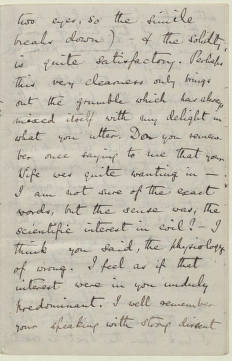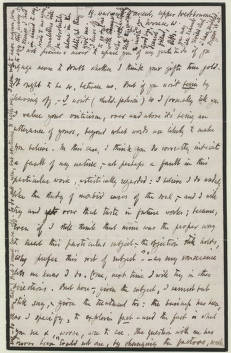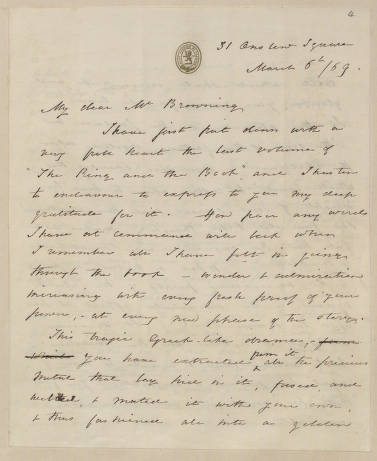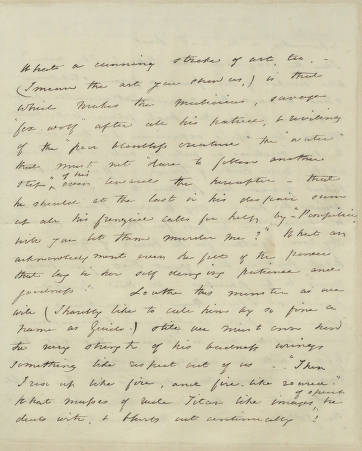Letters:
15 November 1868 Julia Wedgewood to Robert Browning
19 November 1868 Robert Browning to Julia Wedgewood
6 March 1869 Helena Faucit Martin to Robert Browning
Rare Item analysis: Letters to Robert Browning: Browning Under Scrutiny
by Allison Le Grice
Between 1868 and 1869, Robert Browning published The Ring and the Book, a four-volume poem based off of the 1698 Franceschini murder case that Browning learned about through The Old Yellow Book that he found at a bookstall. The Ring and the Book elicited responses from different readers, some of whose letters can be found in the Armstrong Browning Library. Two specific letters I observed were from Julia Wedgwood, a close friend of Browning, and Helena Faucit Martin, an English actress. By examining the correspondence between a poet and readers, one can better grasp the meaning and intention in the poet’s work. Through these letters, I focused on what was unintentionally revealed about the nature of the poet.
Helena Faucit Martin wrote a letter to Robert Browning on March 6, 1869 to praise his artistic ability in The Ring and the Book. The letter is located in The Browning Letters database, which is hosted by the Armstrong Browning Library: http://digitalcollections.baylor.edu/cdm/compoundobject/collection/ab-letters/id/17862/show/17852/rec/25 Martin compares the poem to a “Greek-like drama” filled with tragedy. The influence of her profession as an actress on her perception of the poem allows her to view it as merely a work of art. One of the main characters in The Ring and the Book, Guido, who is responsible for murder, does not shock Helena with his evilness. Guido captures Helena’s fascination because of Browning’s portrayal of such an intricate and cunning character. She claims, “The very strength of his badness wrings something like respect out of [readers].” Helena is not concerned with Guido’s evilness because, to her, The Ring and the Book is just a dramatized story. Through her letter, Helena reveals a very common view of the poet – worthy of praise and truly gifted to be able to depict alarming elements in his characters that communicate life’s truths to man.
A letter written by Julia Wedgwood to Robert Browning on November 15, 1868 expresses a view different from Helena’s praise. The correspondence between Wedgwood and Browning can be accessed at: http://digitalcollections.baylor.edu/cdm/compoundobject/collection/ab-letters/id/12808/show/12788/rec/68 and http://digitalcollections.baylor.edu/cdm/compoundobject/collection/ab-letters/id/7127/show/7123/rec/17.
Wedgwood, an intimate friend of Browning, is more critical of Browning’s work, which allows readers to have a deeper insight of his true nature as opposed to mere praise. She begins her letter by expressing her concern that an “interest [in evil] were in you unduly predominant.” As a close friend and someone who has read several of his works, Julia recognizes that the evil nature Browning attributes to his characters is obsessive. Throughout this letter, she describes ways in which his characters reflect more of himself than the actual person they were created to reflect. As an overall critique of his work, she writes, “it seems so characteristic of you—though it does seem to me an artistic defect.” Instead of portraying characters of an evil nature, Wedgwood was afraid that Browning was portraying a true reflection of himself since she saw so much of him in those characters. Robert Browning responded to this criticism well by asking Julia to point to more sections where he depicted too much of himself, since he was not entirely aware of it. Additionally, Browning admits that he enjoys “the study of morbid cases of the soul.” Acknowledging that he had this particular obsession but not realizing that it was showing in his work raises the question of how much of himself Browning was portraying in his infamous characters.
All throughout studying dramatic monologue, we practiced what we called putting the “I” under scrutiny – we discussed the meanings behind what the speaker was saying as distinct from the way they wanted to be perceived. Robert Browning, the mastermind who created dramatic monologues, unknowingly reveals certain things about himself that are entirely separate from the way that he wants to be perceived. On one hand, we have this actress who represents the way he is presenting himself as an artistic genius to society, and on the other hand we have this close friend, Julia, who puts him under scrutiny and notes ways in which The Ring and the Book contains deeper and more evil aspects of himself that are distinct from his public image. As the letters imply, it is possible that Browning’s poems reveal darker aspects of himself that he may have desired to keep hidden.
Reading through Robert Browning’s letters is useful to anyone studying his literature. These particular letters are helpful in understanding Browning’s use of dramatic monologue as well as the influence that his literature had on Victorian women. One might learn more about Browning’s relationships with others and their influence on his work, as well as more about the poet himself. Overall, reading a poet’s letters will always give one insight into their work and life.
|
|
|
 |
|

JW to RB 15 Nov. 1868 |

RB to JW 19 Nov. 1868 |

 HFM to RB 6 March 1869
HFM to RB 6 March 1869